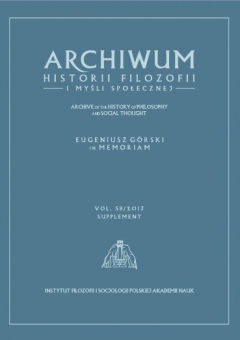Les droits de l`homme et du citoyen dans la philosophie des Lumières
Human and Civil Rights in the Enlightenment Philosophy
Author(s): Marian SkrzypekSubject(s): Civil Law, Human Rights and Humanitarian Law, Philosophy of Law, 18th Century
Published by: Instytut Filozofii i Socjologii Polskiej Akademii Nauk
Keywords: Republicanism; naturalism; conventionalism; human rights; civil rights; natural rights; positive rights; social contract; general will; sovereignty of the people;
Summary/Abstract: The differentiation between human and civil rights in the Enlightenment philosophy is connected with two tendencies to interpret social phenomena, which appeared in the thought of ancient Sophists and Stoics and were fully developed by the 18th century philosophers (Locke, Hobbes, Rousseau, Mably) along with the ideologists of French and American revolutions (Jefferson, Paine, Marat, Robespierre). Naturalism and conventionalism are those two tendencies. Naturalism put emphasis on individual rights of the human being conceived as a biological entity to preserve life. Conventionalism pointed to human rights of citizens stemming from the social contract. Coming close of those two tendencies appeared in the human and civic declarations in the period of the French Revolution in 1789, 1791, 1793, 1795. The natural human rights were best taken into account in the declaration from 1793.
Journal: Archiwum Historii Filozofii i Myśli Społecznej
- Issue Year: 2013
- Issue No: 58supl.
- Page Range: 75-92
- Page Count: 18
- Language: French

